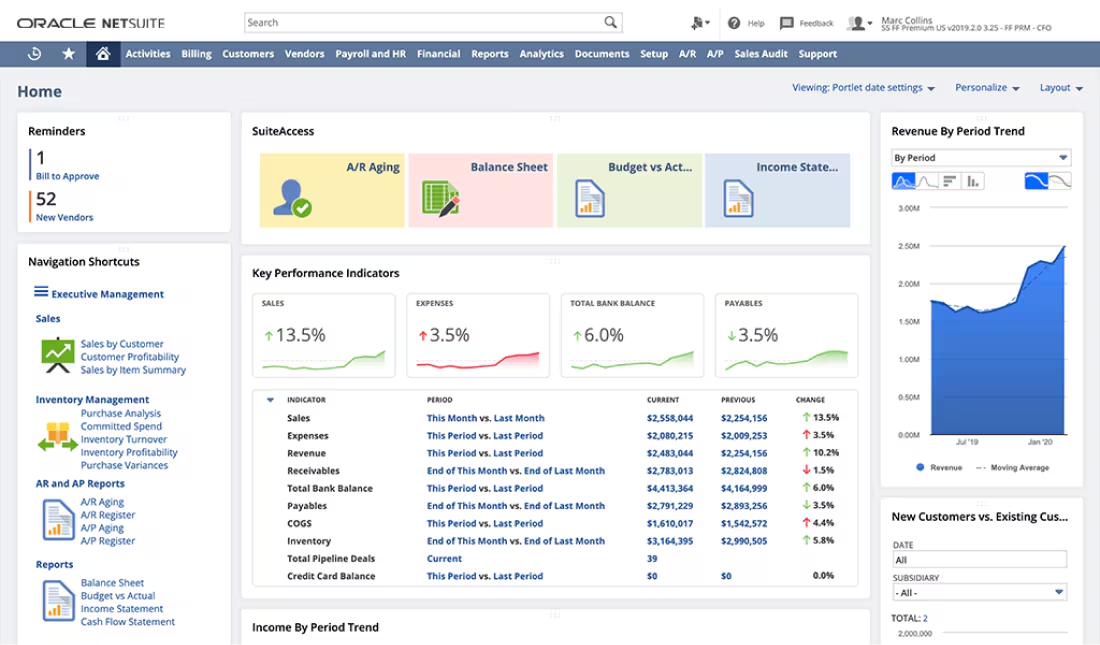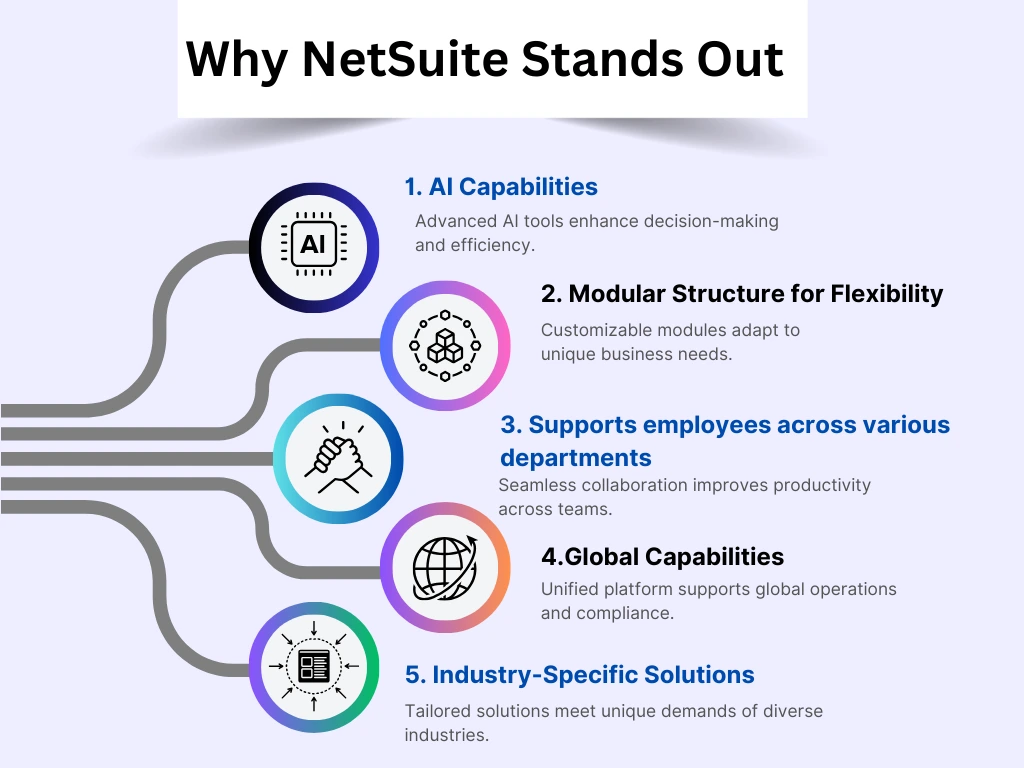What is NetSuite? A Detailed Guide on Leading Cloud ERP System
Jan 06, 2025

Running a business can be tough, especially when you have to deal with different systems that don’t work well together. Imagine how much easier it would be if you had one business management platform that combined all your important business functions—like finances and customer relations—into a single, reliable tool.
That’s where Oracle NetSuite comes in. It’s a top cloud-based ERP (Enterprise Resource Planning) solution designed to make your business operations smoother, more transparent, and easier to grow. Since Oracle acquired NetSuite in 2016, it has grown quickly and now helps over 40,000 customers in more than 200 countries boost their productivity.
In this guide, we’ll cover NetSuite’s main features, modules, key benefits, and costs. We’ll also explain how it can be implemented, which industries it works best for, and how it can be integrated with other systems.
Oracle NetSuite is a cloud-based ERP platform that provides a complete business management solution for managing key business processes. As a Software-as-a-Service (SaaS) tool, it removes the need for on-site hardware, making it a cost-effective and scalable option for businesses of all sizes. With NetSuite, you can manage financials, inventory, eCommerce, customer relationships, and more—all in one place.
NetSuite offers built-in automation and real-time reporting, giving businesses clear insights into their operations. This helps organizations make quick, informed decisions. Plus, its modular setup allows companies to customize the system based on their specific needs, whether they need tools for financial management, human resources, or project management.

NetSuite is used by businesses to simplify operations, gain insights, and scale efficiently—all from a single cloud-based platform. Rather than focusing on individual modules, NetSuite helps organizations solve real-world business challenges and streamline workflows across departments. Here’s how companies leverage it:
NetSuite helps teams reduce manual tasks, eliminate redundant processes, and keep workflows consistent. By automating routine activities, employees can focus on strategic initiatives rather than administrative work.
With real-time visibility into business performance, organizations use NetSuite to make smarter decisions. Managers can quickly identify trends, spot potential risks, and plan for growth with confidence.
As businesses expand, NetSuite provides the flexibility to scale operations without disruption. Companies can add users, launch new products, or enter new markets while maintaining efficiency and oversight.
NetSuite serves as a unified platform where teams—from finance and sales to operations and customer support—can access the information they need. This improves communication, aligns goals, and accelerates project execution.
For multinational businesses, NetSuite is used to navigate global complexities. Organizations manage multiple currencies, tax regulations, and compliance requirements seamlessly, ensuring smooth operations across borders.
In essence, NetSuite is used wherever businesses need a single, adaptable platform to simplify processes, make informed decisions, and grow efficiently—without the complexity of multiple disconnected systems.
Oracle NetSuite is built to support various business processes with its wide range of modules. It covers finance, supply chain, CRM, HR, and project management, all powered by a wide range of NetSuite modules. Each module is designed to meet specific operational needs, helping organizations manage their resources effectively. Here are the main modules and key features list that make NetSuite a top choice for ERP:
It covers finance, supply chain, CRM, HR, and project management, all powered by a wide range of NetSuite modules. These modules work together within a single platform to deliver real-time visibility, automation, and scalability for businesses of all sizes.
NetSuite’s financial management tools help businesses keep accurate financial records and make accounting easier. Key features include:
NetSuite’s CRM module helps organizations manage their interactions with customers throughout their journey. Key NetSuite CRM features include:
“Companies using NetSuite’s financial management features have seen a 55% reduction in the time it takes to close their financial books, boosting overall efficiency”.
– NetSuite
NetSuite’s eCommerce tools help businesses create and manage their online stores effectively. Key features include:
Effective inventory management and supply chain management are vital for running a business smoothly. NetSuite offers:
For service-based businesses, NetSuite’s PSA tools help with efficient project management, including:
NetSuite HCM manages employees, payroll, and performance, ensuring compliance and efficiency.
NetSuite supports manufacturers with tools for production planning, scheduling, and work order management.
For businesses handling complex contracts or subscription models, NetSuite ARM automates revenue recognition and ensures compliance.
NetSuite helps businesses streamline purchasing, vendor management, and spend analysis.
Project accounting integrates financial management with project management for accurate tracking of costs, budgets, and revenues.
NetSuite tracks, manages, and reports on all company assets throughout their lifecycle.
NetSuite includes powerful analytics and reporting tools that help organizations:
In addition to its core ERP components, Oracle NetSuite offers a variety of features that enhance its functionality and adaptability to different business needs. These features contribute to the platform’s reputation as a versatile and powerful tool for organizations across various industries. Below, we explore some of the notable additional features of NetSuite:
NetSuite’s adaptability is one of its most significant advantages. The platform allows for extensive customization to meet specific business requirements:
For organizations operating in multiple countries, NetSuite’s OneWorld offers features designed to support global business operations:
NetSuite’s ability to integrate with other systems is crucial for businesses looking to streamline their operations:
NetSuite offers mobile capabilities that empower users to access vital business information on the go:
Implementing Oracle NetSuite ERP represents a strategic investment that offers numerous advantages for organizations seeking to enhance their operational efficiency and competitive positioning. The following outlines the key benefits that can be realized through the adoption of NetSuite:
Oracle NetSuite streamlines business operations by integrating diverse functions into a unified platform. This integration reduces the necessity for manual data entry, thereby minimizing errors and inconsistencies. As a result, organizations can expect:
A significant advantage of NetSuite is its capacity to provide a holistic view of organizational performance. This visibility is crucial for effective management and strategic planning:
NetSuite is designed to adapt as businesses evolve. Its scalable architecture supports growth by allowing organizations to:
By consolidating multiple disparate systems into a single ERP solution, organizations can realize significant cost efficiencies:
NetSuite’s integrated CRM capabilities empower organizations to deliver superior customer service, which is essential for maintaining a competitive advantage:
Navigating compliance and risk management is a critical concern for businesses today. NetSuite provides essential tools to assist organizations in these areas:
Read More : Detailed guide on NetSuite Pros/benefits and Cons
Oracle NetSuite is a versatile ERP solution designed to cater to a wide range of industries and business sizes. Its customizable features and modular architecture enable organizations to tailor the system to meet their unique operational requirements. Below, we explore how NetSuite serves various sectors effectively.
Manufacturers face distinct challenges, including supply chain management, production planning, and inventory control. NetSuite addresses these needs by providing:
In the competitive retail landscape, businesses must offer seamless shopping experiences while managing diverse sales channels. NetSuite supports retail operations by offering:
Wholesale distributors operate in a fast-paced environment where efficient order management and supply chain visibility are crucial. NetSuite provides:
Professional services firms require robust project management and resource allocation capabilities. NetSuite solution for professional services automation features offer:
Non-profit organizations face unique operational challenges, including donor management and grant tracking. NetSuite offers solutions tailored to the needs of non-profits:
As e-commerce continues to grow, businesses must adapt to rapidly changing consumer preferences. NetSuite supports e-commerce operations by providing:
NetSuite’s advanced AI capabilities provide executives and managers with intelligent insights and predictive analytics. This empowers them to make data-driven decisions rapidly, enhancing the ability to respond to changing market dynamics and optimize performance in real time.
Because NetSuite is modular, meaning businesses select components and modules, say, for finance, human resources, supply chain, sales, marketing, etc, they can pick and choose what they need – only paying for what they need – with the option to build out and scale as they grow.

NetSuite supports employees across various departments by providing a unified platform for collaboration. This accessibility to real-time data fosters cross-functional communication, streamlining workflows and aligning organizational goals.
NetSuite was developed to serve not just one country’s needs, but can automatically cater for multiple currencies, languages, tax regimes and compliance requirements. It offers the agility that multinational organisations need to operate in complex, multi-country environments and to stay compliant.
Containers can be configured for industry-specific solutions in verticals such as retail, manufacturing, healthcare, professional services, software, wholesale distribution and many others. A retail suite, for example, would be pre-configured with features that are commonly used in retail workflows as well as some that are unique to the retail vertical.
Starting with NetSuite might seem challenging at first, but with the right guidance, you can make a smooth transition to this robust cloud-based ERP platform. Follow these key steps to begin your journey effectively:
The first step in adopting NetSuite is creating your account. This process begins by identifying your business needs and selecting a subscription plan that aligns with your goals. You’ll work closely with NetSuite’s sales team or an authorized NetSuite partner to define your requirements, choose the appropriate modules, and initiate the account setup.
Once your account is active, the system administrator configures key settings such as company information, financial preferences, and user roles. These initial configurations ensure the platform is tailored to your organization’s structure and processes.
The onboarding process lays the foundation for a successful NetSuite implementation. It includes system configuration to meet your operational requirements, importing essential data, and setting up critical workflows.
During onboarding, your team collaborates with NetSuite experts or implementation partners to optimize the system for your business. Clear communication and attention to detail during this phase help avoid disruptions and prepare your organization for daily operations.
Partnering with the right NetSuite implementation expert can significantly enhance your experience. Certified NetSuite partners possess deep expertise in customizing the platform to suit specific industries and business models. They handle key aspects like data migration, custom workflows, advanced reporting, and system integrations.
An experienced implementation partner not only ensures a smoother deployment process but also minimizes risks and accelerates the return on investment (ROI). Look for partners with a strong track record, relevant industry knowledge, and positive client reviews.
For a comprehensive look at NetSuite implementation strategies, refer to our detailed blog on NetSuite Implementation guide.
To unlock NetSuite’s full potential, proper training is essential. NetSuite offers a variety of training programs, including:
Additionally, working with your implementation partner or certified trainers can provide customized training that aligns with your business workflows, ensuring your team feels confident using the system.
For long-term success, consider hiring professional NetSuite support services. These services provide access to experts who can resolve technical issues, implement updates, and continuously optimize the system. A dedicated support team helps you adapt NetSuite to your growing business needs, ensuring consistent performance and minimizing downtime.
NetSuite operates on a subscription-based model, which means that costs can vary based on factors such as the number of users, selected modules, and additional services. Organizations should also consider implementation costs and ongoing support fees when evaluating the total investment in NetSuite.
It is crucial for businesses to conduct a thorough cost analysis to ensure that they fully understand the financial implications of adopting NetSuite. For a detailed breakdown of NetSuite pricing, refer to our blog on Oracle NetSuite Pricing Guide.

Oracle NetSuite stands as a powerful ally for businesses aiming to streamline operations, enhance productivity, and gain real-time visibility into their performance. By integrating various business functions into a single platform, NetSuite enables organizations to adapt to changing market conditions, ultimately driving growth and success.
Whether you are a small business looking to optimize your operations or a large enterprise seeking to scale your processes, Oracle NetSuite offers the flexibility, scalability, and robust features necessary to thrive in today’s competitive landscape.
If you would like to explore how Oracle NetSuite can transform your business, we invite you to request a demo or inquire about pricing tailored to your organization’s needs.